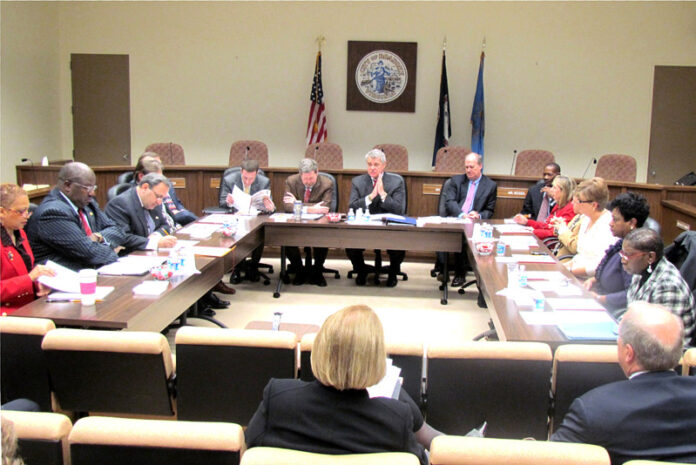
This year Roanoke City will have new help lobbying for their top priorities in Richmond. As part of a cost savings move, the city has eliminated a part-time Richmond lobbyist and will now have consultants to beat on the door of legislators.
Arguing the case for RCPS and the city’s top five priorities will be the firm of Alcalde & Fay. Robert Catron and Randy Cook from the Arlington firm attended Monday morning’s legislative program. Roanoke City’s delegate Onzlee Ware and delegate-elect Chris Head were also on hand to listen to the city’s wish-list. Senator John Edwards was in Richmond but had his legislative aid Alison Baird represent him.
Roanoke City School Board member Annette Lewis and chairman David Carson made the case for their one priority – that classifications given by the VHSL to high schools not be based solely on their size.
The Virginia High School League places Roanoke City’s high schools in the AAA classification creating a hardship on student athletes and a financial burden on the school system in travel cost.
RCPS has failed to convince VHSL to reclassify the schools to AA so they can compete locally.
The school board is asking for an oversight committee to resolve school division appeals. The other option would be for the General Assembly to establish a study committee to review the effects of the VHSL on student athletes, programs and school budgets.
“Roanoke City transportation costs are in the $200,000 range in a time that budgets are tight,” said Carson. The lose of instructional time “is in the 7100 hour range.”
VHSL has taken the stance that lowering the classification would create an unequal playing field but they have been working with Roanoke lately, said Carson. They created a combination district with Franklin County, Patrick Henry and William Fleming in the AAA classification.
Councilman Sherman Lea said, “it’s hard for me to understand how complex that it has become.”
Delegate Ware pre-filed a bill but remarked that it has been questioned. “Why shouldn’t homeschooled [students] be able to play varsity in the area in which they go to school … also Christian schools.” Ware said they had been able to “beat back that charge” so far though these parents pay taxes too he explained.
Ware said Roanoke City was the only school in the 2011 session to raise the issue of the cost of transporting athletes.
City Attorney Presents His Last Legislative Program: City Attorney Bill Hackworth presented his 24th and final legislative program before he retires at the end of the month. First on the list, again this year, was the TransDominion Express Commission proposed by Sen. John Edwards. The commission, when established, would identify needed infrastructure and resolve conflicts with freight rail in an effort to provide passenger service for Roanoke.
The city found a friendly new delegate in Chris Head to champion passenger rail service. Delegate-elect Head said he saw it from a “business owner” perspective. Transportation in and out of the valley inhibits business growth. “Rail transportation will help that,” he said.
Hackworth asked for restoration of the $1.5 million of state budget cuts to localities. That would be difficult, admitted delegate Ware – “if any of this looks like, feels like a tax increase it isn’t going to happen.”
Control of the discharge of pneumatic weapons should be restored to densely populated localities having less then 1000 persons per square mile, said Hackworth. Police personnel have difficulty discerning them from real guns and some of them are extremely powerful.
If only one thing gets done in this session it will be either for the state to pay for unfunded mandates or repeal them. Hackworth pointed to the governor’s study commission that had already produced 31 pages of mandates that could be eliminated.
“If you look at them they are just ridiculous,” said Hackworth. “We’re all behind the governors effort to streamline the government.”
Other wish-list items include a solution to the problem of owners who move their boats and planes in an effort to escape taxation. The city estimates it loses $1.75 million of revenue annually.
The city also is asking for an increase in the vacant building fee from $25 to $250 a year and nuisance abatement that would allow the city to go on an owner’s property to correct overgrowth.
Vice-Mayor David Trinkle had a few more items: Continued funding for the Virginia Commission for the Arts, conservation easement incentives, domestic violence fees, outdoor lighting and smoking regulation, banning plastic bags, and legal advertising cost reduction.
Council member Anita Price added the need for stricter control of predatory lenders and stressed that the General Assembly should not shortchange schools. “A balanced budged is important but not on the backs of our school children,” she said.
Ware said with the onslaught of virtual schools, charter schools, private Christian schools, homeschools – “we’re in a dog fight for the public school systems … I can’t just in a vacuum say without careful thought they shouldn’t have some benefit,” said Ware. Though Roanoke City is somewhat socio-economically depressed “that’s just the reality … money alone has no impact on how much you can learn.” He said the school system should continue on its path of improving the graduation rate.


